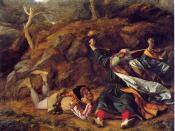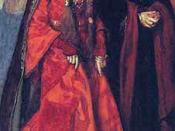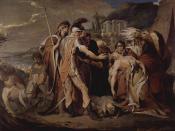In Shakespeare's King Lear, Shakespeare paints Lear's egotistic attitude, both of which made his life tormented and full of misery. Because of his poor judgement and excessive pride, he loses not only the kingdom that he takes pride in but most importantly, the daughter that loves him the most. However, as the play progresses, Lear journeys from egoism to humility and death.
Lear is a very egotistic man. In the beginning, the foolish king (who out of whim) issues a challenge to his children to which they must respond by trying to outdo each other in praising their father. The daughter who displays the most affection takes the largest part of the kingdom. He says,
...Tell me my daughters
Which of you shall we say doth love us most
That we our largest bounty may extend
Where nature doth with merit challenge.
(I.i.38-39, 49,52-54)
To this, his elder daughters (Goneril and Regan) both express their love claiming that despite being married, they love their father with their "all."
On the other hand, the youngest daughter Cordelia feels that her "love's/More ponderous than my tongue" and says "nothing" when the king asks her to "draw/A third more opulent than your sisters." (I.i.lines 88, 86-87) By refusing to offer praises to her father, Lear who is "injured" by the daughter "he loved...most" (I.i.line 291), disowns and disinherits Cordelia.
The first scene of Act I gives the readers a clear view on Lear's egoism. He sees himself as righteous, and his decisions just. When the Earl of Kent tells him to reconsider his decision, he refuses to do so and goes as far as accusing Kent to being a "recreant" and banishes him from the kingdom, saying that "on the tenth day the following,/Thy banished trunk be found in our dominions,/Thy...


